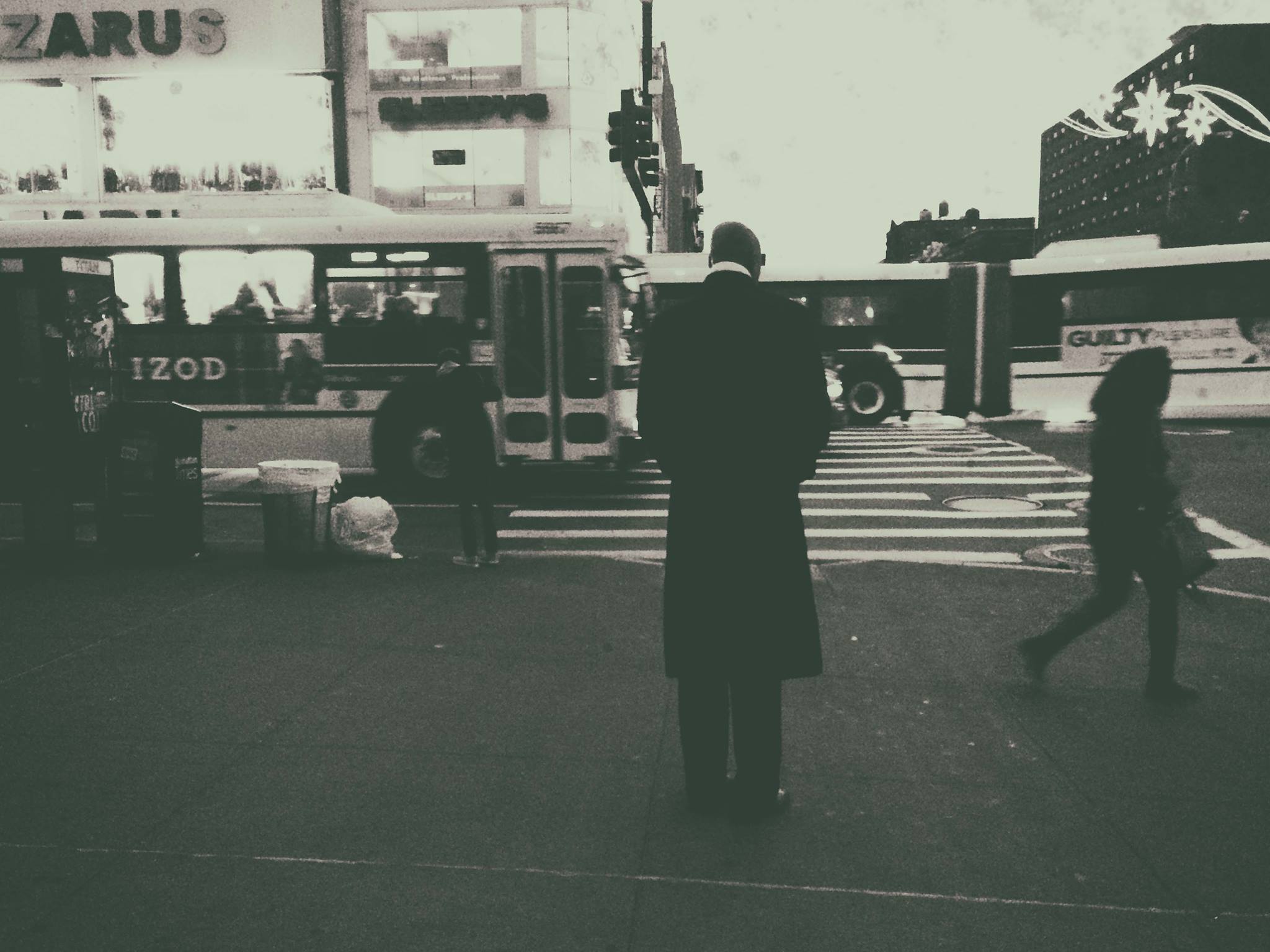Black on Both Sides: Tales of a Bicontinental Negro. {Part 1}

{Photo credit: Leon Cato}
“Its hard to tell how old you are because colored people age so well.”
As the comment nonchalantly slipped out of her mouth, I felt my spirit fly out of my body and stand five feet away to observe me, a black fool, sitting there caught totally off guard and totally alone.
I should have known better. Now I could feel everyone’s eyes and judgment, even people who weren’t there. It was like I was caught in racial limbo with whites in one section and blacks in another — both having nothing to do with me. And now I was left to maneuver myself out of this abyss, and try to salvage the evening and my dignity.
I was sharing a quiet moment with a white British woman with whom I truly had no business sharing a quiet moment. This was now made clear. But this is an example of the rare cultural access I was allowed, given the sheer novelty of who I was.
As one might expect, I would soon learn the price of this access, and this example was just the beginning. Coincidentally, around the same period, little to my knowledge at the time, my corporate career was maturing and the realities of a time-tested, entrenched ecosystem of suppression would make itself known.
Until this point, everything had been going extraordinarily well. It wasn’t that I was ignorant of the intrinsic differences between white and black Londoners, for that was glaringly obvious. Nor did I believe that racism didn’t exist in the UK. But up until this point, I was able to transcend the indigenous racial mores and be the cultural newcomer from a place that everyone found fascinating.
I made friends from all ethnic, cultural and economic backgrounds, and accepted invitations to boozed-up corporate events, concerts, shows, dinners, day outings, sporting events, bachelor parties, weddings and house parties alike and traveled freely around Greater London and Europe, often on a whim. I really enjoyed going to work everyday, and my professional accomplishments grew rapidly. Life was pretty good.
But nothing lasts forever. And when my friend made the colored remark, it simultaneously served as both crushing reminder and ominous foreshadowing. In many ways, it was a PTSD trigger, like escaping one war-torn country only to experience military aggression, signs of civil unrest and feelings of hopelessness all over again.
My reprieve from oppression was officially over.
I was raised in the United States of America. Land of the free and home of contradictions. Where people of color could be both Presidents and inmates, and we could celebrate the opening of a historical African American Museum the same week we witness two more unarmed black men gunned down by police.
Like most, I learned the realities of racism as an adolescent. I saw the devastating effects of the crack epidemic on my community, the murders of Yusef Hawkins and Eleanor Bumpurs, and the criminalization of the Central Park Five. But for me, everything came to a head in 2004 when being a 30-year-old MBA stuck in a job that wouldn’t promote me forced me to make my escape.
London was calling. And once I got a job and became settled, London was the only place I wanted to be.
You couldn’t taste the racism there like in the US.
People were less pissed off in London, less aggressive, less outwardly discriminatory. I understood there were differences, varying sentiments and attitudes, but generally getting on with your daily life felt like more of a priority than the color of your neighbor’s skin.
But people are people. And oppression against people of color in the West is such a given that when meeting another black person in a new city, you can casually ask “So how is the racism here?” almost as if it was the soup of the day.
So of course this moment was coming from the instant I landed at Heathrow. This very distinct British mix of classism and racism. My white British friend was of a different class than me. The class that never took the time to learn that colored was an outdated term that many found offensive.
A Director at my company was from the same class, and this allowed him to casually mention at lunch, totally out of context, that 95% of the prison population in the UK were people of Afro-Caribbean descent, and was shocked when I challenged his source.
Within 18 months of that initial quiet moment with my friend, the realities of being a black professional in England became more clear as well. Despite bringing in significant revenue to my firm, my ascent up the corporate ladder stalled. I was unable to connect the dots until a friend reminded me of the factor — my skin color.
Here we go again.
Everything changes once you get your wake-up call.
The wake-up call itself is a sporadic occurrence when, often in a state of disillusion, you are snapped back to reality by a specific event. It always comes at unexpected times. Never when your guard is up, like when traveling in a new and different part of the world, or when at a sporting or social event where you are clearly a minority.
It always happens when you are relaxed, calm, and most likely in a situation where you actually feel comfortable. To attempt to describe the feeling would be like trying to explain astrophysics to a two-year-old. But unlike advanced science, this is something clearly in front of your face, and you can feel it as surely as anything you have ever experienced.
There you are — isolated, different and unequal.
You could have just discussed the most complex international macroeconomic theories, or debated through eight genres of musical geniuses from the last 40 years. No matter. You are not one of the majority. And that is a prevailing factor in all that you say or do.
Everything changes. Your guard is now up. Your emotions are like an exposed nerve. Your judgment becomes clouded by the assumption that everyone views you differently — that maybe your novelty status is all they see.
When people discuss the psychological impact of racism, it is often dismissed. Perhaps because this is not a tangible thing. It is only recently that the use of the word privilege has managed to make a way for a discussion that effectively frames an oppressive society in a broader sense. The sense of, you can do this, but I am not allowed.
To put it into further perspective, as a person of color, you can never really tell if your accomplishments or failures are, in their truest form, a reflection of your individual ability.
This is because everything has been decided and determined through a prism. So if you accomplish the same as a white counterpart, you are likely extraordinary because your path was undeniably different from his or hers. Conversely, any failures can be difficult to measure for the same reason.
For example, was I not being promoted because of my own mistakes, abilities, personality, lack of accomplishments? Was I not palatable enough? Pure racism feels like a cop-out. But what if that’s all it really is? Did I not play the game properly? Did I become too confident? It is actually impossible to tell. And this can really mess your head up.
Patriotism has always befuddled me. Maybe it is because I have a multilayered background (technically I am an Afro-Caribbean, Black British, Black American). Conversations with black cousins and friends who would criticize the US from a British perspective were always very odd. How could they feel so proud of a country that isn’t theirs?
More surprisingly, while living in the UK I regularly fielded questions about the US, which I found difficult because I was asked to defend a country that I didn’t wholly believe in. Of course, people from outside assume that being a citizen of a country permits you to speak on its behalf.
But as a black man, I have always felt like an alien in the United States.
And I don’t think I am alone in that sentiment.
What becomes abundantly clear as a person of color in the West is that you establish one of many coping mechanisms in order to function on a daily basis. Immersion vs exclusion, acceptance vs defiance, fear vs complacence. Truthfully, I would say that most operate with a combination of all of the above.
The fact is- as a black person you have to make a conscious decision on how you will function, how you will survive and which mechanism aligns with your soul.
Your place is undetermined. Your home undefined. Your status temporary. Sometimes this is clearly laid out for you, and sometimes patience and a heightened awareness are required to truly understand.
Eventually, you create your own space, a space within your own mind because that is the only safe domain.
And this space is yours, and yours alone.
***
Born in London and raised in New York, Leon Cato is a documentary/portrait photographer and visual artist with a style that lies evenly between traditional and contemporary photography and visual media. Leon honed his photography skills upon returning to London in 2004, and left the corporate world in 2010 to focus on photography full-time. Having moved back to New York in 2012 after 8 years, he is currently developing documentary photography, multimedia and film projects dealing with issues of social change and justice. Leon has previously had work highlighted in a variety of publications including The Independent, Creative Boom, The Huffington Post, Edge of Humanity and Daily Mail.
***
{Join us on Facebook, Twitter, Instagram & Pinterest}
Comments
Comments are closed.



Nikon Photography Courses Uk Daily Mail | Learn Photography Studio
November 6, 2016 at 10:57 pm[…] Black on Both Sides: Tales of a Bicontinental Negro. {Part 1} – More surprisingly, while living in the UK I regularly fielded questions about the US, which I found difficult because I was asked to defend a country that I didn’t wholly believe in. Of course … […]
Black White Photography Magazine Uk Back Issues | Learn Photography Studio
November 9, 2016 at 1:05 am[…] Black on Both Sides: Tales of a Bicontinental Negro. {Part 1} – It wasn’t that I was ignorant of the intrinsic differences between white and black … Having moved back to New York in 2012 after 8 years, he is currently developing documentary photography, … […]